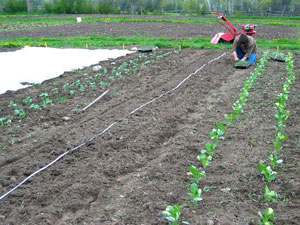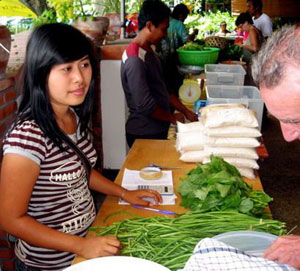Organic Grower
Tasks & duties

Organic growers may do some or all of the following:
-
complete management plans on how the production will be organic
-
test the soil or have professional testing done to ensure the land is free from residues of pesticides so they can gain organic certification
-
decide what crops will be grown
-
hire and train workers
-
prepare soil for planting using natural methods such as composting or cultivating worms
-
plant, prune, thin and weed crops or orchards
-
use natural methods to control plant pests and diseases
-
pick, grade and pack the produce in cases, cartons or bags
-
ensure that produce is stored in the required temperature and conditions, refrigerating if necessary
-
process crops into another product such as juice or cider
-
market goods with an emphasis on the organic nature of the produce
-
maintain business and crop records
-
maintain and repair machinery, fences, shelters and irrigation systems
Skills & knowledge

Organic growers need to have:
-
knowledge of organic growing methods
-
knowledge of organic pest and disease control methods
-
understanding of environmental issues and the theories behind organic growing
-
planning and organisational skills
-
knowledge of competitors' products and of how to grade produce
-
skills in marketing, business management and administration
-
horticultural, nursery and orchard skills
-
problem-solving skills
-
communication skills
Entry Requirements
To become an organic grower, you need to be certified by a recognised body. Organic growers can choose one or more of four organic certifications in New Zealand, three of which allow growers to export. Every year growers need to reapply for certification, and provide a management plan showing how the production is organic.
http://www.agriquality.co.nz audits (checks the quality and validity of) organic products using the certification Certenz, under which organic produce can be exported. Before growers can apply for this certification they need to have been actively organic for two years for annual plants and three years for perennial plants.
The Bio-Grow New Zealand certification allows produce to be exported. Bio-Gro gives growers looking to be certified organic transition status after two years (which means their produce can be exported, but must be labelled as in transition from conventional to organic) and full organic status after three years.
Organic Farm NZ is a certification that follows Bio-Grow production rules for domestic growers, but is not recognised overseas. This certification involves reviews by other regional organic growers and is audited (checked for quality and validity) by The Soil and Health Association of NZ.
The Biodynamic Farming and Gardening Association (Demeter) has a wide range of standards that must be followed, and is generally recognised as a stricter certification than the others.
Secondary education
Three years of secondary education is preferred and useful subjects include horticulture, biology and English. A tertiary entrance qualification may be required to enter further training.
Tertiary education
A tertiary qualification in horticulture or organic growing is an advantage for organic growers.
Training on the job
Many skills are gained on the job, and growers may study part-time towards a horticulture qualification.
Useful experience
Any work on orchards, nurseries or farms, and with machinery is good experience for organic growers. Marketing and business experience may also be helpful.
Related courses
Crop Production
Farm Management and Agribusiness
Horticulture
For more information, please refer to Career Services.
Document Actions
